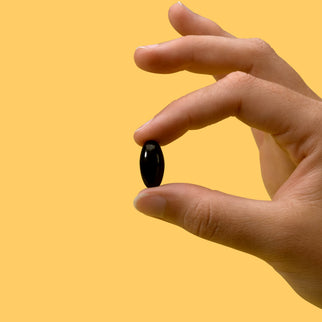We're all familiar with that mid-afternoon slump, the one that has us reaching for that extra cup of coffee or energy drink. It's a common scenario, given our fast-paced lifestyle and the demands of work, family, and everything in between.
There’s no denying that caffeine has become a go-to solution to keep our eyes open and energy levels up — but what if we told you there's a healthier, more sustainable way to maintain your energy, one that doesn't involve a caffeine crash?
Welcome to the world of plant-based energy. This isn't about munching on a salad leaf and hoping for the best. It's about harnessing the power of nature to nourish our bodies and keep our energy levels steady.
At iwi life, we’re dedicated to promoting sustainable, plant-based nutrition. Our mission is to help you discover the benefits of plant-based omega-3 from algae, a powerhouse of energy and wellness that can help support your healthy energy levels.
Why Do We Rely on Caffeine for Energy?
Caffeine is a stimulant, which means it works by speeding up the messages between the brain and the body. When that hot cup of coffee hits your system, it blocks the receptors for adenosine, a neurotransmitter that signals your brain to feel tired. The result? You feel more alert and focused, at least for a little while.
Like all good things, the caffeine high doesn't last forever. Over time, your body can become dependent on caffeine to feel alert. This means you may need more and more to get the same energy boost, leading to a vicious cycle of highs and crashes. And let's not forget the other potential downsides, like disrupted sleep, increased heart rate, and jitters.
It's a familiar pattern: you have a coffee, you feel great, then a few hours later, you're back to feeling sluggish. This is the caffeine cycle — caffeine can give you a quick energy boost, but it's often followed by a crash as the effect wears off. This can leave you feeling even more tired, leading you to reach for another caffeinated drink and starting the cycle all over again.
How Can You Get More Energy Without Consuming Caffeine?
What if we told you that there was a way to maintain steady energy levels throughout the day without the highs and lows of caffeine? Here are a few things that you can do to give yourself energy without relying on caffeine:
Regular Exercise
Adding regular exercise to your daily routine can work wonders for your energy levels. Whether it’s a morning jog, a lunchtime yoga session, or an after-dinner walk, physical activity helps to get your blood flowing and oxygen pumping. This not only wakes up your muscles but also sends a rejuvenating jolt of energy to your brain. Plus, exercise releases endorphins, the feel-good hormones, creating a natural high that can keep you energized and happy.
Eat a Balanced Diet
Eating a mix of nutrient-rich foods, such as fruits, vegetables, and whole grains combined with lean proteins ensures your body gets a steady stream of energy throughout the day. Don’t forget to include some healthy fats which are essential for brain function and can also contribute to a feeling of satiety, preventing energy-zapping hunger pangs.
Stay Hydrated
Think of water as your body's oil. Even slight dehydration can lead to feelings of fatigue and lethargy like low oil can lead to grinding in your car’s engine. Drinking plenty of water throughout the day can keep you properly hydrated and help you maintain your energy levels. For added benefits, consider incorporating hydrating foods in your diet. Certain fruits and vegetables are loaded with water and can provide a refreshing energy boost.
Get Enough Sleep
Quality sleep is key to maintaining your energy levels. It's during sleep that your body repairs and rejuvenates itself. Aim for at least seven to nine hours of sleep per night. Establish a regular sleep schedule and create a restful environment to ensure a good night's sleep. Remember, a well-rested body is an energized body.
Reduce Stress Levels
High-stress levels can be a significant energy drain. Incorporate stress-reducing practices into your routine, such as meditation, deep-breathing exercises, or simply taking time out for a hobby you love. These can help clear your mind, improve your mood, and boost your energy levels, making you ready to take on the world with renewed vigor.
Limit Alcohol
While a glass of wine or a cold beer may seem like a good idea to unwind, alcohol can interfere with your sleep cycle and lead to a lack of quality rest. This can leave you feeling groggy and low on energy the next day. Moderation is key — try to limit your alcohol intake and opt for hydrating alternatives, like water or herbal tea, especially in the hours leading up to bedtime.
Take Regular Breaks
Working or studying for long hours without breaks can lead to mental fatigue, which in turn can sap your energy. Make sure to take regular breaks throughout the day. Stand up, stretch, take a short walk, or even do a quick mindfulness exercise. These little pauses can refresh your mind, boost your concentration, and help keep your energy levels up.
Go Outside
There's nothing like a dose of fresh air and sunlight to boost your energy. The natural light can help regulate your internal body clock, which controls sleep and wakefulness. Plus, the change of scenery can help clear your mind and reduce stress. So, whether it's a quick walk around the block or a leisurely lunch in the park, make time to step outside every day.
Stay Social
Social interaction can be a great energy booster. Connecting with others can lift your mood and take your mind off stress, helping you feel more energized. Whether it's a chat with a colleague, a call to a friend, or a family dinner, staying social can contribute to your overall sense of well-being and vitality.
Limit Screen Time
While technology keeps us connected and entertained, too much screen time can strain your eyes and cause fatigue. Try to take regular screen breaks, especially if you're working on a computer. Consider switching off electronic devices an hour before bed, too — this can help you wind down properly and ensure a good night's sleep, setting you up for a more energized tomorrow.
How Can iwi life Support Your Energy?
Here at iwi life, we believe that the secret to sustained energy doesn't come from a coffee cup, but from the very roots of nature itself. Our mission is to harness the power of algae, one of the earth's oldest and most nutrient-dense organisms, to provide a natural, plant-based boost to your energy levels.
Our star product is our algae-derived omega-3 supplement — but why omega-3, you might ask? Well, these essential fatty acids aren’t just heart-healthy. The health benefits of omega-3 fatty acids are extensively documented. Research shows they support brain and cognitive function, a healthy heart, joint mobility, eye health, and healthy immune system function.† Emerging science has shown that omega-3 fatty acids may act as prebiotics to support the diversity of beneficial gut microbes that can help promote gut health.*
Unlike other plant sources of omega-3, our omega-3s are formulated with AlmegaPL®, our triple-patented form of algal omega-3, which is clinically verified to have superior bioavailability.*
The benefits of iwi life's products don't stop at energy, though. Our omega-3 supplements also support heart health, joint health, brain function, eye health, and overall wellness. It's a holistic approach to health, helping you feel more energized and vibrant from the inside out.
Our AlmegaPL(R) algae is also sustainably farmed in the USA, in the desert of Texas, using saltwater and sunlight on nonarable land requiring zero fresh water. Our methods are designed to minimize energy consumption and resource waste, ensuring sustainability. This means that choosing iwi life's products not only benefits you but also contributes to a healthier planet.
The Bottom Line
In the hustle and bustle of our daily lives, maintaining steady energy levels can feel like a balancing act. However, as we've explored, there are plenty of healthier ways to keep your energy up, without reaching for that extra cup of coffee. From regular exercise and a balanced diet to quality sleep and mindful breaks, these natural energy boosters can help you stay on top of your game.
At iwi life, we're passionate about harnessing the power of nature to support your wellness journey. Our range of plant-based omega-3 supplements, derived from sustainably farmed algae, offer a natural way to support your overall health.
So, why not give your body the nutrients it deserves? Explore iwi life's plant-based omega-3 products today, and discover a new, plant-based option that is better for you and the environment. Here's to a healthier, more vibrant you.
Sources:
Caffeine Use Disorder: A Comprehensive Review and Research Agenda | PMC
A Critical Review on the Role of Food and Nutrition in the Energy Balance | PMC
Water | The Nutrition Source | Harvard T.H. Chan School of Public Health
Good Sleep for Good Health | News in Health
Chronic and Acute Effects of Stress on Energy Balance: Are There Appropriate Animal Models? | PMC
Alcohol Consumption and Sleep Quality: a Community-Based Study | PubMed
Effects of Light on Human Circadian Rhythms, Sleep and Mood | PMC
Why Spending Time With Friends Is One of the Best Things You Can Do for Your Health | Time
Is Too Much Screen Time Giving You Eye Fatigue? | Harvard Business Review


















